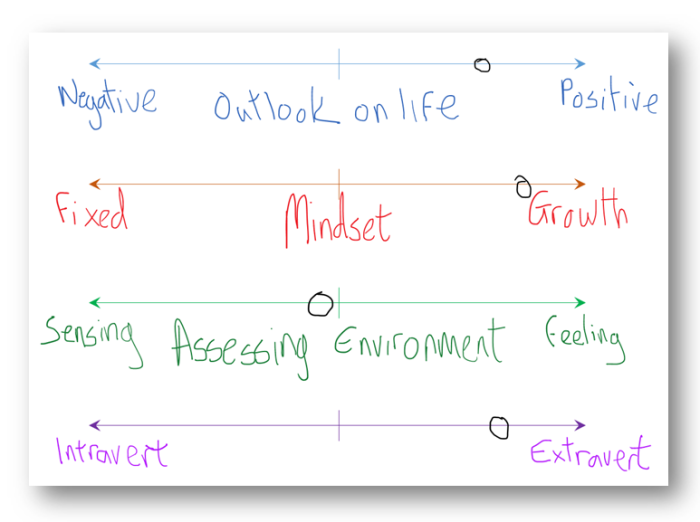Being adaptable is the only way that I know how to live my life. With the type of lifestyle that I have, new customers/new countries, I don’t think that any other way is possible. But my mother reminded me recently that I wasn’t like this as a child. The phrase she used I think was “stamping my feet” if plans had to be changed. So when and how did I become adaptable, and is it important for my children to learn this skill while they are still children? Or is there something to be gained from having a rigid streak that keeps you rooted to your goals?
Like everything in life, being adaptable is a personality trait that lies on a sliding scale. Being adaptable is at one end of the scale, but what is at the other?
There are a lot of these sliding scales – others are easier to work out:
- Outlook on life: Positive or negative
- Mindset: Growth or Fixed
- Assessing your environment: Sensing or feeling
- Introvert or extravert

The theory goes that we all lie at some point along these scales. Let’s take the introvert/extrovert scale as an example. About 20 years ago I took the Myers Briggs assessment along with 20 other new Graduates at my then employer. It resulted in me being recognized as the biggest extravert in the group – I was almost off the scale. Anybody observing the group would have found it difficult to disagree with that result.
Interestingly, the two other grads that I’d instantly bonded with at the residential also sat in exactly the same Byers Briggs square as I did. – They were also both highly extraverted!
We move sideways along these scales all of the time.
While it is true to say that I exhibit extroverted behaviour most of the time, this isn’t the whole story. It is too simplistic to say that I am a full time extravert. Being an extrovert means that I shouldn’t like time on my own – but I do. I get as much strength and re-energisation from time on my own as I do from time spent with others. We move sideways along these scales all of the time.
Anyway, back at the adaptable scale. If being adaptable lies at one end of the trait, what lies at the other? Using my boyhood self for reference I’d say “stubborn”. But I’m looking for a word that also has a positive meaning, and I can’t see anything positive about stubborn.
As I’m drawing a blank I thought that I’d resort to that fountain of all knowledge: Google.
Me: OK Google, what is the opposite of “adaptable”
Google: “unadaptable”
Well that doesn’t really help!
Let’s come at this from a different angle. If I can work out the weaknesses of being adaptable then I can find the strengths I am looking for. This should lead me to a good word. If I’m constantly changing myself to meet my new reality then maybe I’m not standing firm, not remaining true to my core? I might also be abandoning long term goals. In that case, how about some of these words?
- Rigid
- Structured
- Fixed
- Planted
- Immovable
With all of them I can see a negative side, but let’s look for the positive. What would be the positive characteristics on display here if I were to reflect these traits listed above?
- I could stand my ground in the face of opposition when required
- I know what goal I’m chasing after
- I remain true to my purpose
- I keep my core working practices
I can see positives here.
My coach helped me realise that I’d been blocking certain actions within myself. When I thought that one trait was full of positives, I’d only see the negative aspects of it’s opposite trait. As a result I prevented myself from using that other trait. For example, I’ve become adaptable to survive my lifestyle and remain effective at work. However, being planted would also allow me to stand firm if:
- I encountered a situation where I was asked me to do something that went against my core values.
- A new working environment was not favourable for productive working – something I pride myself on being.
Every personality trait has an opposite trait. While we will exhibit one of these more than the other, we will exhibit qualities of both – depending upon the situation.
The real power is to be able to actively choose which is the most appropriate for each situation, rather than letting our emotions dictate this for us.
Do you have a good positive word for the opposite of adaptable?
It is emotional intelligence that gives us the ability to chose our responses. If you would like to read more, then the posts below are a good place to start:



